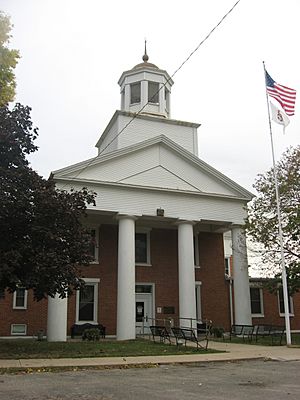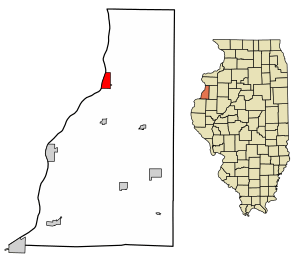Oquawka, Illinois facts for kids
Quick facts for kids
Oquawka
|
|
|---|---|

Henderson County Courthouse
|
|

Location of Oquawka in Henderson County, Illinois.
|
|
| Country | United States |
| State | Illinois |
| County | Henderson |
| Township | Oquawka |
| Area | |
| • Total | 1.86 sq mi (4.82 km2) |
| • Land | 1.47 sq mi (3.80 km2) |
| • Water | 0.39 sq mi (1.01 km2) |
| Elevation | 551 ft (168 m) |
| Population
(2020)
|
|
| • Total | 1,134 |
| • Density | 771.95/sq mi (298.08/km2) |
| Time zone | UTC-6 (CST) |
| • Summer (DST) | UTC-5 (CDT) |
| ZIP Code(s) |
61469
|
| Area code(s) | 309 |
| FIPS code | 17-56237 |
| GNIS feature ID | 2399579 |
| Wikimedia Commons | Oquawka, Illinois |
Oquawka is a small village in Illinois, United States. It is the main town, or county seat, of Henderson County, Illinois. In 2020, about 1,134 people lived there. Oquawka is also part of the larger Burlington area.
Contents
Exploring Oquawka's Location
Oquawka is located in Henderson County, Illinois. It sits right next to the famous Mississippi River.
Land and Water Areas
According to records from 2021, Oquawka covers about 1.86 square miles (4.82 square kilometers). Most of this area, about 1.47 square miles (3.80 square kilometers), is land. The rest, about 0.39 square miles (1.01 square kilometers), is water.
Who Lives in Oquawka?
This section shares information about the people living in Oquawka.
Population Changes Over Time
The number of people living in Oquawka has changed a lot over the years. Here's a quick look:
| Historical population | |||
|---|---|---|---|
| Census | Pop. | %± | |
| 1850 | 553 | — | |
| 1860 | 1,641 | 196.7% | |
| 1870 | 1,370 | −16.5% | |
| 1900 | 1,010 | — | |
| 1910 | 907 | −10.2% | |
| 1920 | 888 | −2.1% | |
| 1930 | 777 | −12.5% | |
| 1940 | 912 | 17.4% | |
| 1950 | 929 | 1.9% | |
| 1960 | 1,090 | 17.3% | |
| 1970 | 1,352 | 24.0% | |
| 1980 | 1,533 | 13.4% | |
| 1990 | 1,442 | −5.9% | |
| 2000 | 1,539 | 6.7% | |
| 2010 | 1,371 | −10.9% | |
| 2020 | 1,134 | −17.3% | |
| U.S. Decennial Census | |||
A Look at the 2020 Census
In 2020, there were 1,134 people living in Oquawka. There were 627 households and 331 families. The village had about 621 homes.
Most people in Oquawka were White (91.98%). A smaller number were African American (1.41%), Native American (0.18%), or Asian (0.44%). Some people were from two or more races (4.76%). About 2.20% of the population was Hispanic or Latino.
Households and Families
About 27.8% of households had children under 18 living with them. About 33.17% were married couples. Some households (11.32%) had a female head with no husband.
Many households (40.19%) were made up of single people. About 23.92% had someone living alone who was 65 or older. The average household had 2.89 people, and the average family had 2.13 people.
Age and Income in Oquawka
The people in Oquawka have different ages. About 19.2% were under 18. About 25.4% were 65 or older. The average age was 48.5 years.
The average income for a household was $40,898. For families, it was $55,650. About 12.0% of the people lived below the poverty line. This included 15.5% of those under 18.
Oquawka's Past: A Journey Through Time
Oquawka has a rich history, from its early native inhabitants to important visitors.
Early Days and Native Peoples
Long ago, the Sauk and Meskwaki tribes lived in this area. They called it Oquawkiek, which means "yellow banks." This name came from the flat lands near the Mississippi River.
Founding and Famous Visitors
White settlers arrived and lived peacefully with the native people. This was thanks to Stephen S. Phelps, who founded Oquawka. He respected the local tribes.
Phelps became friends with Abraham Lincoln, who visited Oquawka often. It's said that Lincoln even met Jefferson Davis here, long before either became famous leaders. In 1858, both Lincoln and his rival, Stephen Douglas, gave speeches in Oquawka. Douglas was also a friend of the Phelps family and the first judge in Henderson County.
A Busy River Town
Oquawka was once a very busy place for trade. It had a mill and was important for shipping goods. People thought the town would grow much bigger. However, when railroads were built elsewhere, Oquawka's growth slowed down.
Even so, Oquawka is still a lively village. It has a downtown that serves local people and visitors who come by boat. There's even a unique road, Illinois Route 164, that goes right into the river! This allows boat trailers to easily launch boats.
The Story of Norma Jean, the Elephant
On July 17, 1972, a circus came to Oquawka. The star was a 29-year-old Asian elephant named Norma Jean. She weighed about 6,500 pounds (2,948 kg).
That evening, Norma Jean was tied to a tree in the village park. A big storm rolled in. A bolt of lightning struck her tree, the only one in the park. The electricity traveled down the chain and sadly killed Norma Jean. The circus quickly left town. Without Norma Jean, who was worth $10,000 and not insured, the circus closed the next year.
A Special Memorial
Townsfolk buried Norma Jean in the park. Later, a local druggist, Wade Meloan, raised money for a memorial. He and a friend built a 5-foot (1.5 m) tall stone wall, 12 feet (3.7 m) long, over her grave. They placed a concrete elephant statue on top and added flowers. A glass case on the wall held newspaper stories about Norma Jean.
The plaque on the wall reads:
“Norma Jean Elephant, Aug. 10, 1942 to July 17, 1972. This memorial is dedicated in memory of an elephant named Norma Jean, who was killed by lightning at this location and lies buried here.”
At the dedication, hundreds of people came. They even rented a baby elephant to carry a wreath to the memorial! Wade Meloan became a big supporter of Norma Jean's story. He sold postcards of the memorial to encourage tourism.
Norma Jean's Legacy Today
A student even made a 15-minute movie about the memorial, which was shown on Showtime. In the mid-1990s, about two visitors came to the site each day. Oquawka even held a yearly festival for Norma Jean, with an "elephant walk" and "elephant ear" treats.
Wade Meloan, Norma Jean's biggest fan, passed away in 2004. Today, fewer people visit the grave. Sadly, vandals once broke the original elephant statue, but the village replaced it.
Facing the Floods
Oquawka, being near the Mississippi River, has faced floods.
The Great Flood of 1993
In July 1993, a big flood turned Oquawka into an island. Roads were underwater, making it impossible to get in or out for about a day and a half. Luckily, most of the village stayed dry because it sits higher than the river.
The 2008 Flood
On June 14, 2008, people in Oquawka had to leave their homes. This was because a levee broke near the swollen Iowa River. The city leaders thought this would make the Mississippi River flood even more. On the same day, two levees broke near Keithsburg, Illinois, flooding that entire town.
Famous People from Oquawka
Many interesting people have come from Oquawka:
- Charles Lincoln Edwards: A zoologist who studied animals.
- Todd Hamilton: A professional golfer who won the 2004 PGA Tour Rookie of the Year award.
- Charles M. Harris: A U.S. Representative for Illinois from 1863 to 1865.
- James McKinney: A U.S. Representative for Illinois from 1905 to 1913.
- Joyce Ricketts: A professional baseball player in the AAGPBL from 1953 to 1954.
Places to Visit in Oquawka
- Delabar State Park: A great place to enjoy nature.
See also
 In Spanish: Oquawka (Illinois) para niños
In Spanish: Oquawka (Illinois) para niños
 | Jackie Robinson |
 | Jack Johnson |
 | Althea Gibson |
 | Arthur Ashe |
 | Muhammad Ali |

